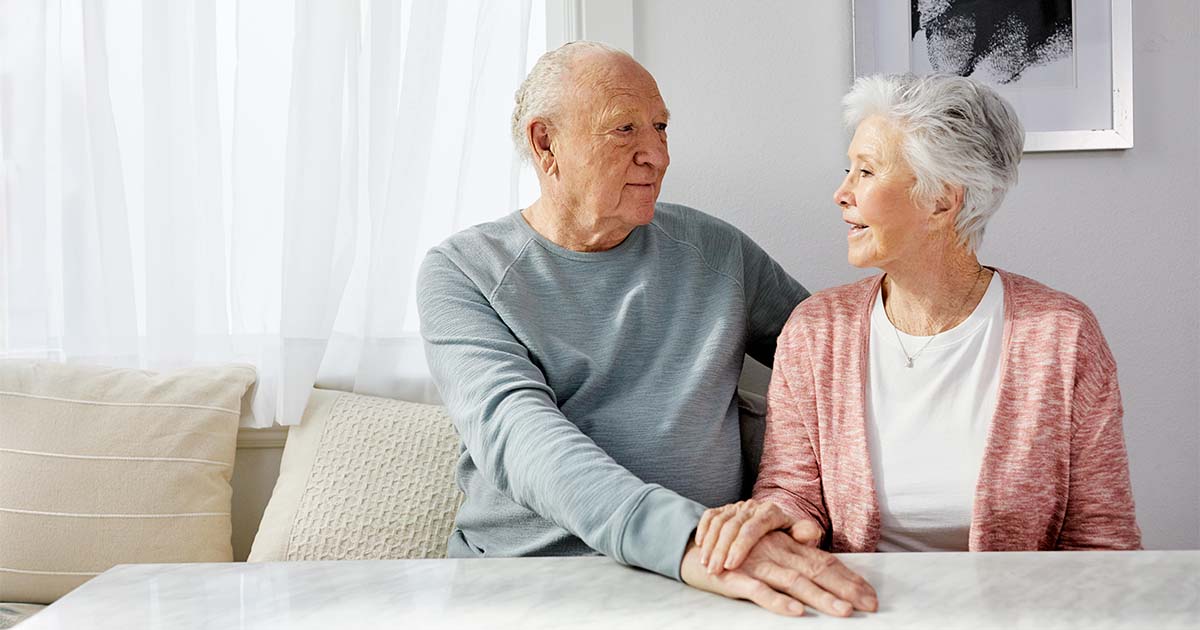What some may consider a time full of joy and celebration, others who are dealing with the loss of a loved one may not feel the same. The holiday season is rife with traditions and family time but if you’re dealing with grief, it can be difficult to navigate long-standing or new holiday traditions after losing a loved one.
Grief during the holidays
It’s common to experience heightened emotions of grief and sadness during your first holiday season without a loved one. Just because the holidays are depicted as a happy season doesn’t mean that feeling down and lonely is wrong.
In order to heal, you have to give yourself the permission to grieve and feel your loss. When it gets hard, you can always remind yourself that grief is part of the healing process, and there are many other people grieving their loved one’s death this year, especially during the holiday season.
After losing a loved one, people may feel stuck between not wanting to let go of old traditions and not wanting to celebrate the holidays at all. It’s okay to go to one end of the spectrum or to find a balance in the middle.
Keeping old holiday traditions after losing a loved one
For some, it may feel right to honor their loved ones by trying to uphold old holiday traditions. Say your grandmother hosted Christmas dinner and you enjoy cooking – you could host a Christmas feast in her honor.
For others though, trying to match old holiday traditions creates stress, anxiety and may lead to sadness in realizing the holiday tradition will never feel the same without their loved one. In this case, it is okay to let go of old holiday traditions and instead create new ones that feel more suited to you and where you’re at in life.
Starting new holiday traditions after losing a loved one
Although the holiday season can feel routed in tradition, it’s important to recognize that as life changes and people grow older, traditions may need to change as well.
If you find yourself struggling with holiday traditions after losing a loved one, here are a few ideas you could try this season.
Honor your loved one through food, music or entertainment
Maybe your loved one’s favorite dessert was fruit cake or they really loved “The Christmas Song.”
This holiday season, bring their favorite dish, put on their favorite song or watch their favorite holiday movie and dedicate it to them. Small actions like these can make you feel more connected to your loved one.
Study your family history and culture
Have you ever taken the time to trace your ancestry? Maybe your loved one had deep ties back to a certain part of their heritage or enjoyed partaking in a cultural tradition. Spend a bit of time this holiday season learning more about your loved one’s culture and what you can do to honor it.
Start a memorial table
Whether you’re hosting a holiday gathering or not, you can always start a memorial table for your loved one. That way, they are included in whatever new holiday tradition you choose.
Fill the table with pictures and holiday memories such as their favorite ornaments or candies. Consider lighting a candle in their honor. You can even leave a plate out on the table to include them at your holiday dinner.
Find someone else in a similar situation
Although grief can feel very isolating, there is always someone else going through a similar situation. Use this as a point of connection and reach out to others.
Instead of buying your loved one a gift each year, your new tradition could be to take someone else who’s experienced a loss this year out for a meal. Or you could buy a gift for someone who lost a parent or partner. Establishing relationships with other people who are grieving may help you feel more supported and comforted.
If you don’t know of anyone in your circle that shares your grief experience, there are programs like the Letters of Love that allow you to write or receive a message from a compassionate stranger in an effort to help uplift your spirits.
Eat out for your holiday meal
If your loved one was the cook of the family and you have no interest in following that tradition, start a new one by choosing a restaurant to eat at for your holiday meal. You could pick your loved one’s favorite cuisine or just enjoy the fact that you won’t have any cleaning or dishes to do.
Travel someplace else instead of hosting
Your city may be rooted in memories of your loved one. If it feels too hard to spend the holidays in the same place you spent so much time with them, travel elsewhere. Even if it’s to the next city over, establishing a new tradition of traveling may help you cope with the change that accompanies losing a loved one, especially during the holiday season.
Other simple holiday traditions you can do after losing a loved one include:
- Telling your favorite stories about them
- Visiting the place you feel closest to them (grave, their favorite park, etc.)
- Donating to a charity they loved
- Volunteering with a community organization to spend time with others
Grief and bereavement resources
Despite your best efforts to establish new holiday traditions after losing a loved one, you may still find yourself feeling persistently sad, anxious, unable to sleep, irritable or hopeless. If these feelings last for a while and begin to impact your daily activities, schedule time to talk to your physician or a mental health professional.
Grief recovery and grief support groups are available in many communities and accessible through a quick online search. For more information on the grief process and additional resources, you can visit this comprehensive grief support list from the Hospice Foundation of America.
Social Share
At Enhabit our patients are our number one priority. From providing the latest medical practices to building deep personal connections, we’re focused on upholding every patient’s dignity, humanity and sense of control on their health care journey.
Home health
Our home health services give patients access to the care they deserve in the comfort of their own homes. From disease and injury management to recovery from surgery, our clinicians help patients confidently achieve their healthcare goals.
Hospice care
Our hospice care services place importance on the comfort of every patient living with a terminal illness. Our caring professionals are dedicated to providing not just physical care, but spiritual and emotional support to every patient and their loved ones.

 Back to Resource library
Back to Resource library




